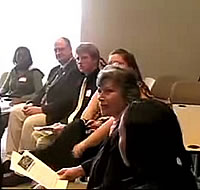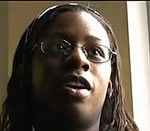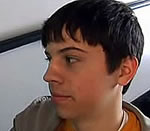 |
|---|
Reprinted with the permission of the Rural School and Community Trust
STEWART, OH—Many students in Ohio have felt the pinch of decreasing funding for their schools. "Several years ago our school had to cut five teachers because of lack of funds," explains Megan Huttleston, a senior at Plymouth High School, a small school north of Columbus. "We lost the choir and shop, too."
Huttleston is describing the effects of the Ohio school finance system. In recent years, state funding has been greatly reduced to many schools, forcing local communities to make up the difference—a daunting challenge for communities with little wealth.
She continues, "In our school so much depends on what the community contributes, but lots of people are at the max of what they can do. People don't understand why they are asked to raise local taxes for our schools when they don't see any new programs or opportunities."
Maggie MacDonald, a sophomore at Warren High School, and Mason Pesek, a junior at Federal-Hocking High—both in rural southeastern Ohio—echoed Huttleston's concerns. "Warren has had to cut teachers and programs," MacDonald said. And Pesek notes that his district is more than a million dollars in debt; local residents have been unwilling to raise the local levy. "Federal-Hocking is in dire economic straits because of the way the state funds schools. We are a district with a large land area, but very little to tax. People own land and farms, but they don't have a lot of cash income to pay additional taxes," he explains.
Supporting House Bill 119
 All three rural Ohio students were part of a group of 17 students from across Ohio who testified before the state's House Primary and Secondary Education Committee in April. The target of their testimony: support for House Bill 119. The bill, proposed by Governor Ted Strickland, would fund regular public schools before providing funding for charters and private school voucher programs. It would also increase the state share of school funding, a move that would help cash-strapped, low-wealth school districts provide more educational opportunities.
All three rural Ohio students were part of a group of 17 students from across Ohio who testified before the state's House Primary and Secondary Education Committee in April. The target of their testimony: support for House Bill 119. The bill, proposed by Governor Ted Strickland, would fund regular public schools before providing funding for charters and private school voucher programs. It would also increase the state share of school funding, a move that would help cash-strapped, low-wealth school districts provide more educational opportunities.
Kyle Smiddie, Youth Organizer for the Ohio Fair Schools Alliance, which organized the students' appearance at the legislature, notes that the students testified on behalf of all students, not just themselves. They expressed concerns about the educational opportunities of younger siblings and of students in the poorest Ohio communities.
 Huttleston says part of the reason she testified is because she wants her school to remain in the community for her younger sisters and cousins.
Huttleston says part of the reason she testified is because she wants her school to remain in the community for her younger sisters and cousins.
MacDonald spoke to her positive experience in public school, and also noted that even though enrollment is growing, the school has had to cut programs because of a lack of funding. She told the committee that raising additional local property taxes is difficult in her community because many residents are senior citizens on fixed incomes.
Making a difference even though you can’t vote
The students' testimony made a splash in the state's media and helped underscore one of the main lessons the students say they learned from their experience. "You can make a  difference even though you can't vote. What you say matters," Huttleston says.
difference even though you can't vote. What you say matters," Huttleston says.
Pesek points out that a lot of people think students don't care. "But really students often feel they can't do anything about what's happening. If a democratic process is opened up and students feel their opinion matters, they want to participate." He emphasizes, "Students have a lot to share. They can offer important perspective on school reform that adults and administrators don't have. Students are really the only ones who know what's going on in schools. I've been one of the lucky ones to be in an open system where I'm asked to participate."
MacDonald says she learned that people "aren't always nice to you even when you're trying to do something good." But she asserts that it is still important to get out and fight for your cause. "Even though I'm just one person I think I made a difference."
This article originally appeared in Rural Policy Matters, June 2007.




